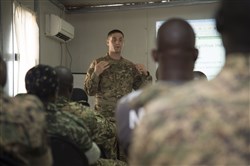MOGADISHU, Somalia - A U.S. Army Soldier deployed to Combined Joint Task Force-Horn of Africa and more than 40 members of the Africa Union Mission to Somalia (AMISOM) gathered for a sharing of best practices for mental health Oct. 10, 2016.
Staff Sgt. Matthew Glaberman, an operations sergeant assigned to Charlie Company, 411th Civil Affairs Battalion, met with Ugandan AMISOM soldiers to talk about the effects of combat stress before, during and after a deployment.
“Today we exchanged best practices with AMISOM troops to assist and better educate soldiers on resiliency to reduce combat stress,” Glaberman said. “The goal is to reduce the stressors on AMISOM troops and mentally prepare troops on the battlefield to maintain a better fighting force.”
The class covered an array of combat stress topics including indicators, contributing factors and intervention.
“The information is what we need as soldiers,” said Uganda People’s Defense Force Maj. Nyende, UPDF psychologist. “We need to know what’s available and what to do when they are coming into the deployment or leaving.“
The blocks of instruction covered how to identify combat stress, intervention, and preventative pre-deployment training to reduce combat stress and increase resiliency.
“If someone knows how to cope with combat stress or [has] a friend that does, it makes it easier,” Nyende said. “If they wait to receive help, it can be harder to manage at that level. So getting help early on makes it easier.”
Nyende said he appreciates the help from the Americans for sharing the information, and hopes the training will be able to help soldiers who may need it. Nyende also said that he looks forward to similar training in the future.
“These trainings help build relationships with AMISOM troops and fortify their forces with the best practices exchanges,” Glaberman said. “[The students] were very responsive, and I feel like they gained a lot of information they did not have before, and may be able to identify with mental challenges they were not able to identify before to better prepare them for future missions.”



